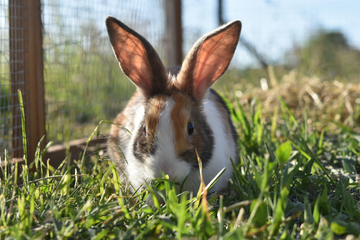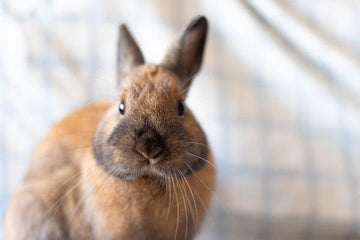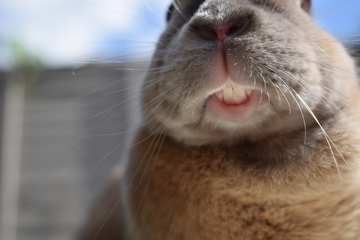Deaf Rabbit Care: Tips and Tricks
Rabbits are sensitive, intelligent animals that rely on their senses to interact with their environment. When a rabbit loses its hearing or is born deaf, it can change the way they experience the world. But with a few adjustments, a deaf rabbit can live just as happily as any other bunny.
Click Here to Shop Rabbit Products.

Providing proper deaf rabbit care means understanding their unique needs. Whether they were born deaf or lost their hearing later in life, these rabbits rely more on their vision and touch to communicate, explore, and bond with their human caregivers. By making small changes to their environment and using alternative communication methods, you can help them feel safe, loved, and confident.
Let's explore the best ways to care for a deaf rabbit and create a supportive, enriching environment for them.
Understanding Deafness in Rabbits
Deafness in rabbits can be either congenital (from birth) or acquired (developed over time). Some rabbit breeds, like Lops, are more prone to congenital deafness due to their ear shape. Their long, floppy ears can block sound, making it harder for them to hear from a young age.
Other rabbits may develop hearing loss due to infections, wax buildup, injuries, or prolonged exposure to loud noises. Age-related hearing loss is also common in older rabbits.
It's important to remember that rabbits rely on more than just hearing to understand their world. They use their whiskers, sight, and even their feet to detect vibrations in their surroundings. A deaf rabbit isn't helpless—it just navigates life a little differently.

Signs of Deafness in Rabbits
It can be challenging to tell if a rabbit is deaf, especially if they've been that way since birth. Unlike dogs or cats, rabbits don't always respond to their names, so a lack of reaction doesn't necessarily indicate deafness. However, there are some signs to watch for:
No reaction to loud noises, such as clapping, calling their name, or dropping an object nearby.
Becoming easily startled when approached from behind.
Relying more on visual cues and vibrations to understand their surroundings.
Struggling to communicate with other rabbits, sometimes leading to misunderstandings.
Sleeping more deeply and not waking up as easily as hearing rabbits.
If you suspect your rabbit is deaf, a veterinarian can perform tests to confirm it and check for any underlying medical conditions contributing to their hearing loss.
Creating a Safe Environment for a Deaf Rabbit
Since deaf rabbits can't hear approaching footsteps, household noises, or potential dangers, it's important to set up a secure and predictable environment for them.
Tips for a Safe Home
Keep furniture and their enclosure layout consistent to prevent confusion.
Use rugs or different textures to help them navigate spaces.
Stomp gently on the floor before approaching to create vibrations they can feel.
Avoid sudden movements that might startle them.
Block off unsafe areas with baby gates or barriers.
Protecting a Deaf Rabbit Outdoors
Deaf rabbits are more vulnerable outdoors since they can't hear predators or potential threats. If you let your rabbit explore outside, keep these precautions in mind:
Always supervise outdoor time and use a secure playpen.
Provide hiding spots where they can retreat if they feel unsafe.
-
Ensure the area is escape-proof, as they may not hear approaching dangers.

Communication Strategies for Deaf Rabbit Care
Since deaf rabbits can't rely on sound for communication, they use other senses to interact. Hand signals, vibrations, and routines are great ways to communicate with them.
Hand Signals and Visual Cues
Use consistent hand gestures for feeding time, playtime, or bedtime.
Wave or tap gently on the ground to get their attention.
Use a flashlight or soft light flicker as a signal in dimly lit rooms.
Using Touch to Communicate
Gentle touch can also be a helpful way to communicate. Try these techniques:
Lightly tap their enclosure before opening it.
Use gentle strokes or a soft brush to indicate affection.
Let them sniff your hand before petting them to avoid startling them.
Socialization and Enrichment
Like any other rabbit, a deaf rabbit needs companionship and mental stimulation. They might communicate differently, but they can still bond with humans and other rabbits.
Introducing a Deaf Rabbit to a Companion
If you're bonding a deaf rabbit with another rabbit, introduce them slowly. Deaf rabbits may miss subtle body language cues, so watch interactions closely to prevent misunderstandings.
Providing Mental Stimulation
Enrichment is crucial for keeping your rabbit engaged. Some great activities include:
Food puzzles and foraging games.
Safe chew toys to keep their teeth healthy.
Cardboard tunnels and hideouts for exploration.
One-on-one playtime with gentle petting and grooming.
Veterinary Care for Deaf Rabbits
Regular vet check-ups are essential for all rabbits, especially those with special needs. Since deaf rabbits rely more on vision, keeping their eyes healthy is just as important as monitoring their ears.
A rabbit-savvy vet can help check for infections, monitor overall health, and provide guidance on rabbit-proofing your home.
Final Thoughts on Deaf Rabbit Care
Caring for a deaf rabbit requires patience and understanding, but the bond you form with them is incredibly rewarding. With a safe environment, consistent communication, and plenty of enrichment, your deaf rabbit can live a happy and fulfilling life.
Deaf rabbit care is all about adaptation. By using visual cues, maintaining a structured routine, and providing gentle interactions, you help them feel secure and loved. They may not hear your voice, but they'll understand your kindness through your actions.

Rabbit Is It Low Maintenance or More Work Than You Think?

Signs of Rabbit Health: What You Should Know

Decoding Bunny Behavior: Understanding Rabbit Mood






